- Home
- Helen Forrester
Minerva's Stepchild
Minerva's Stepchild Read online
This book made available by the Internet Archive.
----------------------------------------------
MINERVA'S
STEPCHILD
---------------------------------------
HELEN FORRESTER
---------------------------------------
BEAUFORT BOOKS, INC.
New York • Toronto
Table of Contents
Part One ONE
TWO
THREE
FOUR
FIVE
SIX
SEVEN
EIGHT
NINE
TEN
ELEVEN
Part Two TWELVE
THIRTEEN
FOURTEEN
FIFTEEN
SIXTEEN
SEVENTEEN
EIGHTEEN
NINETEEN
TWENTY
TWENTY-ONE
TWENTY-TWO
TWENTY-THREE
TWENTY-FOUR
TWENTY-FIVE
ABOUT THE AUTHOR
To the Liverpool City Police
Part One
SCHOOL
On the top of Liverpool Town Hall sits a golden statue of the Roman goddess Minerva, presiding over a great sea port which adopted her long ago as its particular deity.
One rainy day a gawky little girl named Helen Forrester arrived on Minerva's doorstep—at Lime Street station—and she was as frightened of this strange new city as a stepchild would be of a new mother. Helen knew that Minerva was goddess of wisdom, invention and handicrafts, and that she especially loved the professions, dramatic poets, and actors. She did not seem a stepmother very likely to help a young girl in great distress. But Helen, wet and trembling in the rain, looked up at her rain-washed face and hoped that she could.
ONE
------------------------------------------------------------------------------------
"Shut up, Avril," I said sternly, between chattering teeth. "Everything is going to be all right."
"I'm cold, and I'm hungry." The wail threatened to become one of three-year-old Avril's howling tantrums.
My spectacles were sprayed with rain, and I could not see very well as I peered shortsightedly down Lime Street. But I lifted Avril up and hugged her to my damp school uniform.
"Behave yourself, " I ordered sharply. "We're all hungry. You must be brave until Daddy comes back to collect us."
Fortunately, I did not know that my father, at that moment walking the streets of Liverpool in search of shelter for his sick wife and seven children, had no real idea of what to do to mitigate the catastrophe which had struck him. I presumed that adults always knew what they were doing. I did not know that my mother, sweating with pain on a stretcher in the ladies' waiting room, her six-week-old son beside her, was bordering on a nervous breakdown. I could not understand why we could not go to stay with my grandmother, who lived only a few miles away across the Mersey River. No one had told me she had quarreled violently with her son and his wife, whom she condemned jointly as worthless spendthrifts, and would have no more to do with us.
Busy with school and girlfriends, I had noticed only that my parents' friends had not been dropping in for a drink as frequently as usual. Alan, who was a year younger than I, had pointed out to me a few months earlier that Mother's wonderfril collection of Georgian silver had vanished from the antique sideboard, and I had asked my mother where it had gone.
"Girls should not poke their noses into the business of grownups," I had been told tartly, and I had retreated to Alan for consolation.
"Perhaps it's been sold, " he had whispered uneasily, as he ran his fingers through his corn-colored hair.
"Why?" I asked, my eyes goggled in surprise.
He stared at me reflectively, his wide, blue eyes troubled. "I don't know. There's something wrong. Mary Ann packed her suitcase and left on Saturday."
Mary Ann was our housemaid, a jolly, outspoken girl.
"I thought she'd gone home to visit her mother for a few days—that's what she told me."
"I don't think so. She seems to have taken everything with her. She even asked Cook for her curling iron back."
Our uneasiness grew while Mother was in hospital, having a baby and later major abdominal surgery. Then one day an idle word from a school friend gave us a clue.
Father had done a mysterious thing called "going bankrupt," a not uncommon occurrence in the world of 1930, but strange to me. I had heard vaguely that going bankrupt was an American disease, which had struck Wall Street in New York, and that Americans committed suicide when this happened to them. Mentally, I saw dozens of them hurling themselves off* the tops of skyscrapers, and I wondered where Father would find a skyscraper.
Father had been sent oflF to boarding school by his widowed mother when he was only six years old; he had left it at nineteen to join the army in 1914. My mother, an orphan, had been brought up by nuns. Neither had had any training in the management of a family or a domestic budget, and they had enjoyed a high standard of living by being permanently in debt. Further, they had had seven children. Once the Depression set in and dividends dried up, bankruptcy was inevitable.
The remainder of our servants left in a body while Mother was still in hospital, and I was left to manage the home as best I could, until we moved to Liverpool. While my parents were absent, one of our unpaid domestics carried off my mother's entire wardrobe, leaving her only the outfit she had been wearing when she was whisked into the hospital.
Father had no knowledge of the legal rights of a bankrupt to clothing and bedding, so he sent the key of our house to his main creditor, a moneylender, with instructions to sell the house and its contents, and to reimburse himself from the proceeds. From a misguided sense of honor, he left everything we possessed, except
the clothing in which he and his family were dressed, taking only a pair of blankets in which to wrap my mother and the new baby, Edward. Then, with his last ten pounds in cash, he bought tickets on the train to Liverpool, which was his birthplace.
He remembered Liverpool as a bustling, wealthy city and hoped to find employment there, perhaps as an accountant. He had not visualized what the Depression was doing to the north of England. He could not imagine that a man who desired work would not be able to find it.
Liverpool looked a dreadfully dismal place to my untutored eyes. Water swirled along the gutters, carrying a horrid collection ofgarbage.
Along the pavement men in shabby cloth caps shuffled fi-om litter bin to litter bin to sift through the garbage for food and cigarette ends. In the gutter stood four unemployed Welsh miners, caps held hopefiilly out while they sang over and over again in sad tenor voices "Land of our Fathers" and "All Through the Night."
"Are you lost?"
I jumped and Avril stopped wailing. A policeman, water running down his cape and helmet, was bending over us, his red face concerned.
"No, thank you," I said primly, and since he continued to look down at us doubtfially, I added, "Mummy is in the waiting room."
He smiled in a fiiendly fashion.
"Better go back to her, luv," he said. "Lime Street is no place for a nice young lady—and yell get wet."
Reluctantly, I retraced my steps to the waiting room.
Father had been away four hours or more. Baby Edward had not been fed and was crying lustily. Indian-dark Brian and fair-haired Tony, aged six and five respectively, were playing tag around and around the high, varnished benches. I could see that Brian was afi*aid. His little hands were clenched tight and his heart-shaped face was grim. Tony was playing the game with his usual cool care, watching his elder brother closely to anticipate every move he made. His mind seemed to work with such intelligence that i
t was as if he had been bom with a brain already mature and fiimished with knowledge.
Fiona, aged nine, was still sitting silently by my mother, nursing her favorite doll, her pale-blue eyes wide with dumb fear. We idl loved Fiona with unquestioning devotion. She never had tantrums as Avril and I did; she never seemed to get dirty or forget her table manners. But now even placid Fiona needed asylum.
Mother lay on the stretcher, her eyes closed, her face ethereally white. An empty teacup on the bench beside her spoke of the kindness of the lavatory attendant. None of us had eaten since breakfast, a meal of toast hastily consumed, and now it was iifter four o'clock. I knew that my mother had no money in her handbag, so it was no good offering to go and buy something to eat from the station restaurant.
I went up to my mother. A tear lay on her cheek.
"Are you all right. Mummy?"
"Yes, dear. I got up and walked for a few moments a little while ago."
"You'll soon be better. Mummy? "
"Yes—yes, I have to be. "
I picked Edward up from beside her and, holding him against my shoulder, tried to stop his healthy bellows for food by walking up and down with him.
Alan had been kneeling on a bench by the window, watching the horses and drays in the station yard. Now he came and walked with me. We did not talk; both our hearts were too heavy.
Mother had been in hospital until Christmas Eve, a scant eight days ago. I realized, with a sense of shock, that Christmas and New Year had passed uncelebrated, lost in a foggy nightmare of quarrels, recrimination, and general disorder in the house. Mother had discharged herself from the hospital, before the doctors thought she should, so that we could come to Liverpool.
As I clucked sympathetically at Edward, it seemed madness to me to embark on such a journey with Mother still so ill. I had no conception of the panic gripping my parents—a panic which had made them lose all sense of proportion. They had been brought up in a little world of moneyed people, insulated by their private means from any real difficulties or hardships. When the money vanished, they had no idea what to do, beyond trying to obtain a "suitable " position. A moneylender was, to them, a ruthless Scrooge. I do not think it occurred to them that, if he had been
apprised of Mother's illness, he might have had a little compassion. And so they compounded their own troubles unnecessarily.
My relief was overwhelming when my father, soaking wet, came into the waiting room. He went straight to my mother. She opened her eyes and surveyed him sullenly.
"I have obtained two rooms. Not very good. Just for a week." He sounded breathless and on edge. "Had to pay in advance. Walked back. I'm going to get a cab."
My mother closed her eyes, and my heart sank. They were trying not to talk to one another again.
Father vanished into the vast cavern of the station, and Mother told me to help the boys get their overcoats on.
A few minutes later, Mother was carried on the stretcher with the aid of a porter to a taxicab, the children trailing behind, and the baby and Avril still crying. The procession caused some interest in the station, and I remember my face burning with embarrassment under the shadow of my velour school hat. Well-bred people, I had had it drummed into me, did not draw attention to themselves.
Mother crawled into the cab, and the porter folded up the stretcher, which belonged to the railway company. Somehow we all squeezed into the taxi, a hungry, forlorn group too tired to talk.
A stout, untidy blonde opened the door to us, releasing a suflPocat-ing odor of unwashed bodies, old cooking, and cats. The woman beamed at us, however, and welcomed Father like an old friend. She helped him assist Mother into a room so shabby and so dirty that I could honestly say that I had never seen anything like it before. Next to it was a bedroom with two double beds crammed into it. There were no sheets or pillowcases, just greasy pillows and gray blankets.
Mother sank onto a broken settee, while our landlady looked us over.
"You can keep coal out back and use t'kitchen and bathroom." Her battered face showed pity. "Ah'll give yer enough coal to start a fire. Coalman'll be along the street this afternoon, and you can get some then."
The room was very cold, and Mother looked around it disdainfully, but she said, "Thank you."
"Come on, luv," the landlady addressed me. "There's a booket in that cupboard. We'll fill it, and you can bring it back."
After a trip through linoleumed passages and a littered, stinking kitchen to a coal house by the back door, I staggered back with a bucket of coal, some wood chips and a newspaper. After much anxious effort. Father got a fire going. It was the first time he had ever made a fire.
Alan, usually so cheerfijl, said heavily, "When shall we have something to eat?"
"How much money have you?" Mother asked Father.
He went through his pockets, and laid the results of his search on the settee, so that we could see the small pile of coins in the light of the bare electric bulb hanging fi-om the ceiling.
"Two and ninepence, " he announced helplessly.
Thirty-three precious pennies would buy quite a lot in those days, though they would not last long in a family the size of ours.
In a dull monotone. Mother upbraided him bitterly about the mess he had got us all into, and Father snarled back that she had never been any help to him. Finally, Edward's wailing drew his attention to more immediate concerns, and he said, "There is a little comer shop down the road. We could at least get some milk for Edward."
"And for me," said Avril, thrusting her small chin aggressively forward.
"Be quiet, Avril," I whispered, afi-aid that my parents would start to quarrel again.
"Won't, " replied Avril defiantly, but she did keep quiet thereafter.
Finally, it was decided that since Father was already wet through he might as well go out to the shop and buy all the food he could.
When he had departed, the children crouched around the miserable fire, and Mother managed to change Edward's diaper. We had only three diapers with us, and the baby had not been changed since we had set out that morning. He was, therefore, in a disgusting condition. Mother gave me the diaper she had removed, told me to find the bathroom, wash the dirty garment, and bring it back to dry by the fire. I wandered off, sick and dejected, and did the best I could with cold water and no soap in a Victorian bathroom that stank of half a century of neglect.
Our spirits rose when Father returned with milk, two loaves of bread, margarine, tea, sugar and a small packet of sausages. He had also brought a twopenny packet of Woodbines. With cigarettes in their mouths, our parents became a little more civil to each other.
Under Mothers instructions, I made a feed for Edward and then fed him. He was ravenous. Father cooked sausages on the smoking fire, found a knife in the kitchen, and cut the bread and spread it with margarine. We sat around on whatever we could find and ate a sausage apiece in our fingers. He managed to boil a pan of water and make tea in it. Mother drank much and ate little. Father finally ate, and only afl:erward did I realize that he had not had a sausage. I felt a crushing sense of guilt about that.
Our landlady called down the stairs to say that she could hear the coalman coming, and my father looked aghast. The coal donated by our landlady was already nearly consumed and we had exactly one penny left. We could do nothing but sit hopelessly silent as the shout of "Coal, coal, one and nine a hundredweight" faded down the street.
That was the first of many years of nights I spent tossing restlessly, napping, waking, unable to settle because of cold or gnawing hunger. Four of us, still dressed in our underwear, were packed into one bed, and Father, Alan, and Brian were to manage in the other bed. Mother stayed on the settee with the baby. For a long time I lay and listened to my parents quarreling with each other, while the baby whimpered and Fiona, her head against my shoulder, chattered inconsequently in her own uneasy sleep. I fell into a doze, fi'om which I was awakened by Mother calling me in the early morning. I was glad to leave the bed, wh
ich smelled of urine, put on my jumper and blouse and go to her.
It had been decided, she said, that Father should enroll Alan, Fiona, Brian, and Tony at an elementary school nearby. I was to stay at home and help with the baby. My loud protest that I would get behind with my schooling was sharply hushed. I was to see the children washed and tidied for school and was to divide the remaining bread and margarine between them for breakfast. All this I did, while shivering with cold. Brian and Tony, also shivering, were scared of going to school, but Fiona and Alan were frankly relieved at the thought of something normal creeping back into their lives.
A breakfastless Father was gone with them for an hour and came back to report the children safely registered. He had put into his pocket, when leaving home, an old-fashioned cutthroat razor, and he now did his best to shave with it, in cold water, without soap. The result was not very good, and his clothing, still wet from yesterday's soaking, looked crumpled and old. He then departed for the employment exchange, a three-mile walk.
Mother, Avril, and I sat almost silent in the icy room. Occasionally, we would feed the baby a little of the remaining milk. We warmed it slightly by putting the bottle down the front of Mother's dress, and we wrapped the baby in Mother's coat. I then tucked our two precious blankets around both mother and child.
The other children came home for lunch, but there was no lunch, and they departed again for school, cold, hungry, and in tears, even brave Alan's lips quivering. Mother, Avril, and I, like Father, had neither eaten nor drunk.
The afternoon dragged on, and the children returned, except for Fiona.
"Fiona's ill," explained Alan anxiously. "A teacher is going to bring her home when she feels better. "
I suppose my mother was past caring, for she said nothing, but, to the griping hunger pains in my stomach, was added a tightening pain of apprehension. Fiona was the frailest of us all. The boys took oflF their coats and then put them on again immediately, because of the cold.

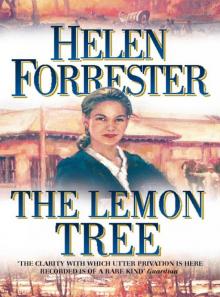 The Lemon Tree
The Lemon Tree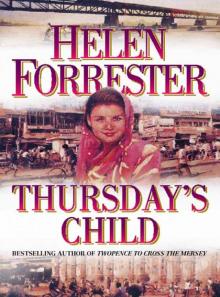 Thursday's Child
Thursday's Child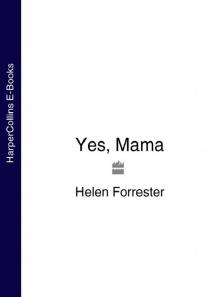 Yes, Mama
Yes, Mama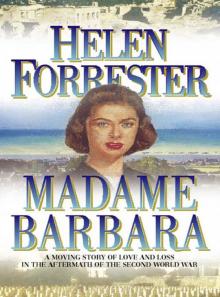 Madame Barbara
Madame Barbara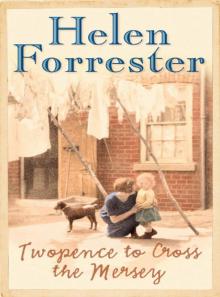 Twopence to Cross the Mersey
Twopence to Cross the Mersey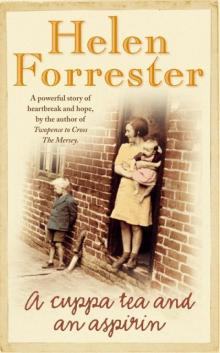 A Cuppa Tea and an Aspirin
A Cuppa Tea and an Aspirin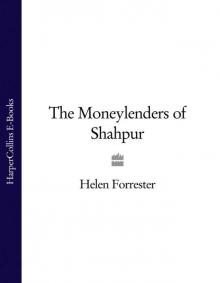 The Moneylenders of Shahpur
The Moneylenders of Shahpur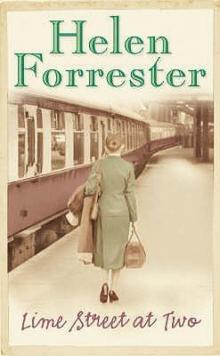 Lime Street at Two
Lime Street at Two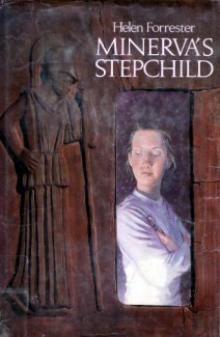 Minerva's Stepchild
Minerva's Stepchild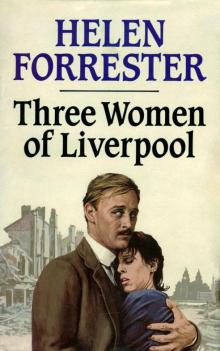 Three Women of Liverpool
Three Women of Liverpool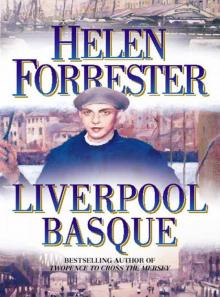 The Liverpool Basque
The Liverpool Basque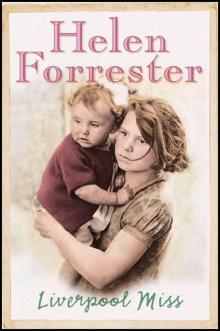 Liverpool Miss
Liverpool Miss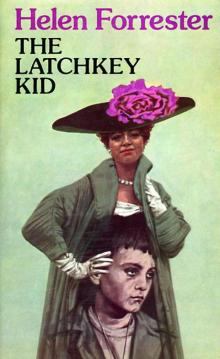 The Latchkey Kid
The Latchkey Kid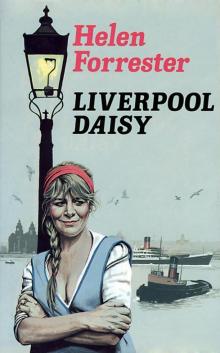 Liverpool Daisy
Liverpool Daisy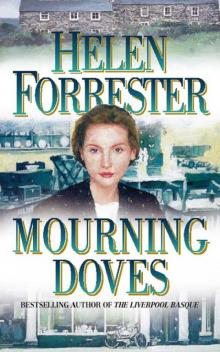 Mourning Doves
Mourning Doves